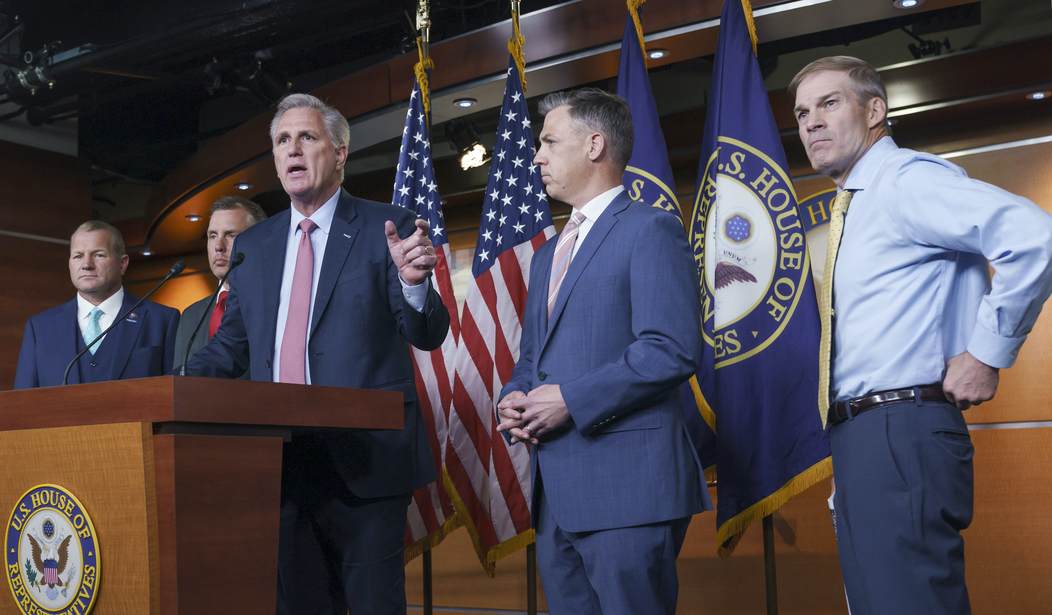The GOP always has to deal with the shaft they get from the legacy media. While the “Commitment to America” (COA) may not go as far as many conservatives would like, it does contain some broadly popular policy prescriptions. Because Democrats and their stenographers in the press know this, they will downplay the details.
However, the game Democrats and the media are playing is easy to see in a recent poll of likely voters. In partnership with the Trafalgar Group, Convention of States Action conducted a national survey to measure how likely voters perceived the case to vote for the GOP made by Minority Leader Kevin McCarthy when he unveiled the COA. It also assessed their feelings on two key issues addressed by the new Republican bargain with the public.
Mark Meckler, president of the Convention of States Action, summed it up nicely. “We found in these numbers a fascinating gap between style and substance.” He went on to explain: “A few weeks ago, we asked voters if the GOP has done enough convincing to earn their vote, a majority said no. In this poll, we wanted to see if House Republican Leader Kevin McCarthy’s ‘Commitment to America’ media rollout last week moved the needle for voters. It did not. The numbers are virtually identical.”
When surveyed, only 33.9% of respondents said they felt McCarthy made a strong enough case to elect Republicans in his speech introducing the Commitment to America. Nearly half said no, and 16.2% said they were unsure. Right after Labor Day, 56.1% said the GOP had not made a convincing case for support in November, and only 10.0% were unsure.
In the new poll, the number of Republican voters who feel their party has made the argument increased by almost 11 points to 71.8%. The number of unaffiliated voters saying a firm no also declined by 10 points. The shift went almost exclusively to the unsure column. Among Democrats, the unsure column increased by eight points. On virtually every crosstab, asking about the COA speech seems to increase the number of voters that report they are unsure. It has to make you wonder how many likely voters have seen it.
Recommended: New Employee Bill of Rights from RedBalloon Helps Employees Fight Woke Policies at Work
Yet, as Meckler observed, “However, when we polled two of the key proposals in the ‘Commitment to America’–voters responded positively and showed support.” The two issues in the poll were the COA proposals for a parents’ bill of rights and energy independence. Both receive majority support at 55.1% and 61.8%, respectively. The majority said they were more likely to vote for a candidate who supported both policies among:
- Republicans
- Unaffiliated voters
- Asian voters
- Hispanic voters
- White voters
- Voters over the age of 23-44
The only demographic where a majority did not indicate they were at least somewhat more likely to vote for a candidate who supported the COA commitment to producing more oil and gas was likely voters who identify as Democrats. Even a majority of black voters and those under 22 want cheaper energy and gas. Meckler summed it up this way: “Voters like what Republicans are proposing, they just don’t believe the GOP sells it well enough. Frankly, they just don’t believe that Republicans do what they say they will do.”
Meckler’s assessment of the GOP’s history of delivering on promises may contribute to the findings. Consistent Republican voters remember the promises to repeal Obamacare when the GOP was out of power. Yet the Biden administration just expanded it because it is still the law of the land. Still, likely Republican voter support for the idea that the GOP and McCarthy have effectively made their case for the midterms following the COA increased during September.
It is the fact that the poll found an increase in the number of unaffiliated and Democrat likely voters who are unsure that needs to be addressed. Those shifts may represent persuadable voters open to hearing the GOP’s message. The messaging problem with these voters, who are less likely to follow conservative outlets, is undoubtedly compounded by the media blackout on the more popular components of the plan.
It is a desperate kind of deflection by Democrats and the media that is evident in the relentless narrative about MAGA Republicans and the revival of the January 6 Committee. Republicans must find a way to break through the noise about the broadly popular components of the COA. This poll shows that energy policy is something that Republican candidates should be talking about incessantly, especially since prices are starting to rise again.
From now until the midterms, no Republican should allow the media to press them on January 6 or President Trump’s legal issues. And while FBI malfeasance is getting worse, the problem must be shelved until after November 8. No matter what question an interviewer asks, they must pivot to the GOP’s commitment to energy independence, parental rights, and the economy so that as many persuadable voters as possible hear them.










Join the conversation as a VIP Member